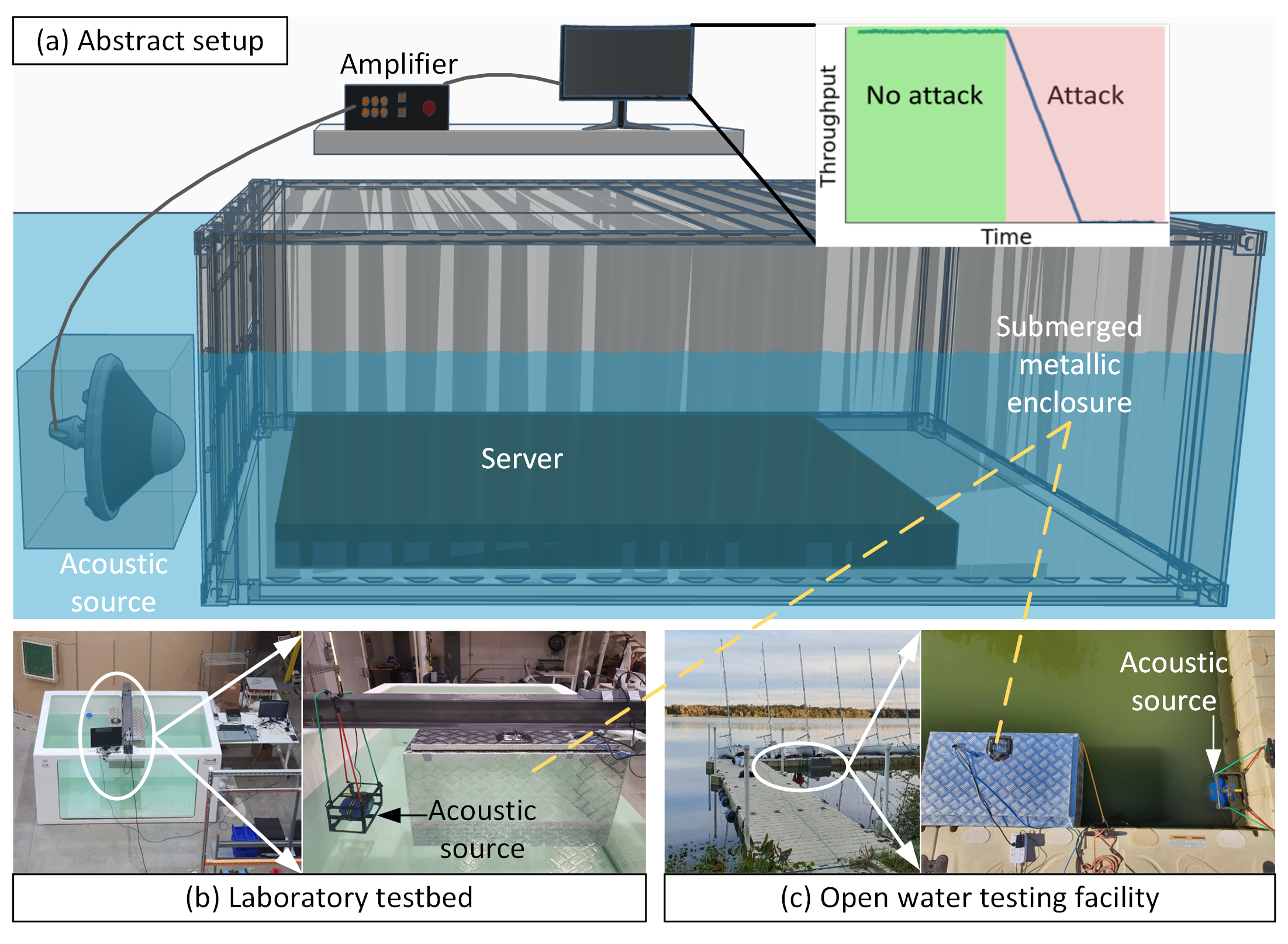Underwater data centers (UDCs) offer exciting potential for data storage and remote computing infrastructures, as they demonstrate advantages due to the natural cooling properties of water, space efficiency, and renewable energy integration (eg, Microsoft project Natick, Texas Subsea Clouds, Beijing Highlander). However, the dense water also quickly carries acoustic signals that can damage or break underwater storage drives. We investigated these vulnerabilities in submerged data centers and storage platforms against targeted acoustic attacks. We found that at the resonance frequency of the drives (between 0.3-1 KHz), the acoustic source can affect the read-write speed and throughput performance of the victim HDDs. We observed up to 100% throughput loss when the source distance is within 10-25cm, using an unsophisticated commercial underwater speaker. We also showed that prolonged attacks for over 80 seconds can cause Denial of Service of system-level applications. While physical access to UDCs is challenging, such targeted attacks can be carried out remotely by underwater robots without tampering with the communication systems or having access to the datacenter structure. In this project, we will design a software defense system and intelligent surveillance strategies for physical/remote acoustic attacks on hardware storage drives of UDCs. Our investigations include the development and assessment of comprehensive preventive and reactive measures against such attacks on a real UDC prototype. We are working on this project in collaboration with the CPSEC lab (Dr. Rampazzi) at UF.

 This capstone project will explore methods to identify vulnerable ways that an assailant (divers or underwater ROVs) may exploit to carry out acoustic attacks on UDCs.
Subsequent efforts will explore how to identify and possibly encrypt energy signatures of UDCs to eliminate or mitigate such attacks by software architecture designs and through
innovative deployment strategies. Our preventive measures include a novel software stack, an agent-based surveillance system, and acoustic attack-proof structural designs.
We will develop an actual UDC prototype pod with operational servers and deploy it underwater to assess the proposed security and surveillance features comprehensively.
This capstone project will explore methods to identify vulnerable ways that an assailant (divers or underwater ROVs) may exploit to carry out acoustic attacks on UDCs.
Subsequent efforts will explore how to identify and possibly encrypt energy signatures of UDCs to eliminate or mitigate such attacks by software architecture designs and through
innovative deployment strategies. Our preventive measures include a novel software stack, an agent-based surveillance system, and acoustic attack-proof structural designs.
We will develop an actual UDC prototype pod with operational servers and deploy it underwater to assess the proposed security and surveillance features comprehensively.
In News!!
Watch a Demo!
AquaSonic Project
This project explores unique vulnerabilities of UDC storage devices, resource allocation softwares, and distributed file systems to acoustic attacks. We empirically characterize the capabilities of acoustic injection underwater and find that an attacker can reduce fault-tolerant storage system throughput by 17% up to 100%. Our open-water experiments (see demo above) show that an attacker can cause controlled throughput degradation at the maximum allowable distance of 6.35 m using a commercial speaker. We further investigate the effectiveness of standard defenses against acoustic injection attacks and propose a novel ML-based detection system that reaches 96% True Positive Rate and 1.75% False Negative Rate. We aim to help industries protect UDCs against acoustic attacks and ensure security of subsea computing infrastructures.
Paper (IEEE S&P-24) Project Page NewsBlueNote Project
This project investigates potential vulnerabilities of storage devices deployed in UDCs and subsea storage platforms against targeted acoustic attacks. Based on our initial investigation of a simplified scenario, a victim HDD deployed in an enclosed submerged container is especially vulnerable to those acoustic attacks, which at frequencies ranging from 300 Hz 1300 Hz can result in up to 100% throughput loss and application crashes. Our proof-of-concept analysis demonstrates how it is possible to remotely interfere with the correct functionalities of high-traffic storage systems deployed in isolated underwater environments without tampering with the victim system or leveraging malware and network attack vector. Therefore, we argue the need for future research including models, testbeds, and methodologies for exploring security challenges of subsea storage platforms.
Paper (ACM HotStorage-23)Publications
- D. Blow, A. Abdullah, J. M. Sheldon, W. Zhu, S. Rampazzi, and M. J. Islam. Detection and Localization of Acoustic Vulnerabilities of Underwater Data Centers for Remote Surveillance. SPIE Defense and Commercial Sensing, 2025, Orlando, FL, US.
- J. M. Sheldon, W. Zhu, A. Abdullah, S.H.V Bhupathiraju, T. Sugawara, K. Butler, M. J. Islam, S. Rampazzi. AquaSonic: Acoustic Manipulation of Underwater Data Center Operations and Resource Management. 45th IEEE Symposium on Security and Privacy (S&P), 2024, San Francisco, CA, US. [project page ] (Acceptance Rate: 17.8%)
- J. M. Sheldon, W. Zhu, A. Abdullah, K. Butler, M. J. Islam, S. Rampazzi. Deep Note: Can Acoustic Interference Damage the Availability of Hard Disk Storage in Underwater Data Centers? Best paper award at the ACM Workshop on Hot Topics in Storage and File Systems (HotStorage), 2023, Boston, MA, US.



